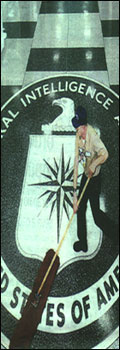Líneas de investigación
Proyectos en Curso
Proyectos Anteriores
 Nueva derecha: ideas y medios para la contrarrevolución
Nueva derecha: ideas y medios para la contrarrevolución  Seminar The New Right II
Seminar The New Right II
Seminar The New Right II |
|
Venue:
International University of Andalusia (UNIA). Monasterio de Santa María
de las Cuevas, Av. Américo Vespucio 2. Isla de la Cartuja (Sevilla) |
Centro vecinal Pumarejo. Plaza del Pumarejo (Seville)
PRESENTATIONPRESENTATION
Let us now begin with two illustrative images. In the second, the spokesman of the Spanish government replies in the House of Commons to questions from the Popular Party (the Spanish right-wing party) on the investigations into the events of 11-M. The questions have an underlying subtext that was drawn up and extensively disseminated by the media of the "new right" for months: "11 March was a coup d'état to defeat the Popular Party, the political price of which is apparent today in the negotiation between the PSOE (the Spanish socialist party) and ETA". To coincide with the appearance of the government spokesman, the Prisa Group started a vigorous attack on the "conspiranoid" thesis that it had ignored up to now. History seems to be repeating itself: the "new right" is not a bad dream that can disappear by a clever combination of silence, moral indignation, and "common sense". The "new right" has broken with the discourse of the obvious and has no intention of "listening to reason": it is at war. Beyond judgement and moral condemnation, it is a case of understanding the reasons for this neo-conservative expansion. What seduction mechanisms does it bring into play? What discontent does it manipulate? How does it relate to the fragmented experience of social and labour matters that dominates the contemporary world? In the congress of last October we identified some characteristics of the "new right": the aggressive break with instituted agreements (the revisionist cause), its popular and populist character, the extremely intelligent and strategic use of the new media, the contradictory but efficient mixture of neo-liberalism and the call for traditional values, etc. In this second part we propose an analysis of the intellectual reaction that accompanies the emergence of the "new right" entrenched in its media war machinery. A heterogeneous and discordant current, but more or less grouped around some common ideas of force (and a past from the extreme left that is perhaps more than anecdotal) such as the meaning of 11 September, the complex of Western guilt, the fifth Islamist column that has arrived with immigration, the very precise identification with the Shoah and Israel, May 1968 as the source of all evil, the equivalence between subversion and terror, the inevitable decadence of a democracy without significance, and the need to "restore" a hierarchical and well ordered social body... Reports, images, and discourses that comply with an absolutely essential task for the "new right": changing the perception of the fragility and uncertainty of globalisation into social panic and security paranoia, translating political, social, and economic conflicts into cultural, ethnic, and religious conflicts between immutable essences ("the conflict of civilisations"); producing and indicating enemies and threats against which only exceptional measures will suffice; and neutralising what is political when we question collectively the naturalness of total war and we open public spaces in order to weave common links.
PROGRAMMEPROGRAMME
Tuesday, 7 November
2006 It is curious that globalisation brings with it a "feudalisation" of social relations: racial hate, religious clashes, ethnical conflicts, social competition, etc. Governing under globalisation includes handling fear, insecurity, and uncertainty. The "new right" does this without ideological restrictions, assuming the inevitable war and the corresponding exceptional measures, manipulating the everyday feeling of frustration. What could "resistance from below" mean then? Could this be thought as a result of the tragic and extraordinary events of 11-M?
Wednesday, 8 November
2006 What part is played by Israel, Judaism, and Zionism in the evolution of many intellectuals from the United States, France, and Spain from the extreme left to the "new right"?
Thursday, 9 November
2006 The role of the "war of principles" in the political and cultural pragmatics of the neo-conservative "movement" in the United States and in Europe. Their relationship with the juncture of what has been called "empire" as it appears in the process and the conflict of global sovereignty. Neo-con decisionism and the decline of the hegemony of the United States.
Friday, 10 November
2006 A huge intellectual, media, and (anti)political operation redefines democracy as "the kingdom of unlimited desires of consumer individualism" and the source of all the problems of our age (the decadence of schooling, social anomy, the war of everybody against everybody, antisocial behaviour, etc.). Faced with consuming subjectivity, which is unsupportive, erratic, and capricious, anti-democratic discourse opposes a "social limiting principle" personified in the institutions representing the "common good": Republic, Constitution, and Parliament. Jacques Rancière analyses in The hatred of democracy (ed. Amorrortu) the last incarnation of a neo-conservative discourse, drawn up and sustained by old 1968 players, the most profound contribution of which consists of the neutralisation of the people and of politics.
Venue:
GUEST SPEAKERSGUEST SPEAKERS
Amador Fernández-Savater
Jacques Rancière
Raúl Sánchez
Juan Aranzadi |

 In October 2005 we initiated the first congress
on the "new right" by wondering about the victory of George
W. Bush in the 2004 elections: how can we understand the success of a
candidate who had based some of the most important decisions of his previous
term of office on lies and manipulations that had been demonstrated publicly?
It was a case of going beyond easy replies about "alienated populations"
and of trying to understand more about the power of attraction of the
populist imaginary in globalisation.
In October 2005 we initiated the first congress
on the "new right" by wondering about the victory of George
W. Bush in the 2004 elections: how can we understand the success of a
candidate who had based some of the most important decisions of his previous
term of office on lies and manipulations that had been demonstrated publicly?
It was a case of going beyond easy replies about "alienated populations"
and of trying to understand more about the power of attraction of the
populist imaginary in globalisation.